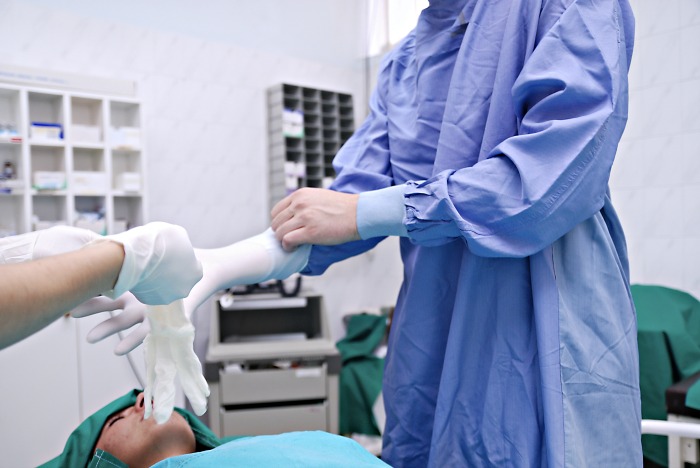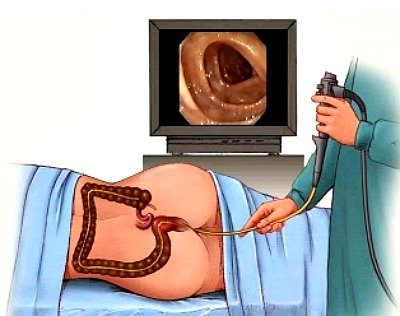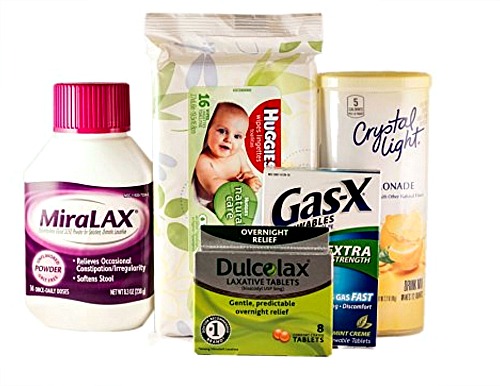Colonoscopy
Overview, Uses, Precautions, Preparation And Complications
What Is A Colonoscopy?
A colonoscopy is a camera test, used to take a direct look at the inside of your rectum and large intestine.
The instrument used to perform colonoscopy is called a colonoscope. It is a long flexible tube about the thickness of a pen, fitted with a light source and camera at its end.
The fiber optic camera takes pictures of the inside of your rectum and large intestine while the doctor gently advances the tube. Since the tube is flexible, the doctor is able to move it around the bends and curves of the large intestine.
A colonoscope can be used to examine anywhere from your rectum through the whole of your large intestine to your cecum, under direct vision. Although it is an invasive procedure, it remains the best way to diagnose colon cancer, polyps, and inflammatory bowel diseases.
There are two forms of colonoscopies - traditional direct vision colonoscopy and virtual colonoscopy. We would discuss traditional colonoscopy here.
What Is The Importance Of A Routine Colonoscopy?
A colonoscopy can screen for colorectal cancer, which includes both colon and rectal cancers.
In the United Kingdom, in 2010, 40,695 people were diagnosed with colon cancer and there were 15,659 deaths from this cancer in 2011.
According to the American Cancer Society, colorectal cancer is the third leading cause of cancer-related deaths in the United States.
The American Cancer Society estimates that there were 50,830 deaths due to colon cancer in 2013. Early diagnosis and treatment is the key to survival.
Colonoscopy save lives.
Why Would Your Doctor Order A Colonoscopy?
There are several reasons why your doctor may order a colonoscopy. They include:
- As part of a routine examination once you are 50 years or more. At 50 years of age, if you do not have any other risk factor, you should have colonoscopy every 5 to 10 years
- If any of your family member - parent or sibling is found with colon cancer or other family cancer syndromes
- Change in your bowel movements
- Chronic diarrhea
- Blood in your stool
- Low abdominal pain that has not been diagnosed with another test.
- If your doctor suspects that you may have polyps
- If your doctor thinks you have ulcers or inflammation of your bowels
- If you have inflammatory bowel disease, such as ulcerative colitis or Crohn's disease
- If your doctor thinks you might have a tumor or colon cancer
- If you have unexplained weight loss
- If you have unexplained iron deficiency anemia
- If you have a positive FIT test (faecal occult blood test also called Fecal Immunoflorescent Test)
- History of Familial Adenomatous Polyposis (FAP)
How Should I Prepare For A Colonoscopy?
The single most important thing you can do to help ensure that you have a successful colonoscopy is to prepare for the test.
You may have heard a lot of people say that colonoscopy is a terrible experience. They often say the worse part of it is not the procedure itself, but the fact that you have to take a laxative to clean your bowls.
Yes. Before you have a colonoscopy, you will be given a "colon prep" to clean out the colon.
Colon prep is done by using a form of laxative called PEG-based laxative. You would be instructed to buy one yourself from your local pharmacy or online. They come in different brand names, and these names may be different depending on where you live. Popular preparations include Peglyte, Colyte and Golytely.
There are universally accepted colonoscopy preparation kits that you can get online containing Miralax and Dulcolax. This kit is usually acceptable for most colonoscopies - be sure to clarify with your endoscopist if they are happy with you using this kit. You can also get the Miralax and Dulcolax Colonoscopy Prep Kit for diabetes if you suffer from diabetes.
The liquid or laxative you drink for the colon prep will cause loose stools or diarrhea, so your doctor can clearly see the walls and the interior, or lumen, of your intestine. You will also be on a liquid diet for about a day before your colonoscopy.
You may be asked to give yourself an enema as well, to clean things from below. An unclean colon can lead to a longer exam, and carries an increased risk of missing important abnormalities. You should be sure to follow the doctor's instructions closely.
Certain conditions may affect colonoscopy. Prior to colonoscopy, let the doctor know about the following details:
- Current medications you are taking
- Allergies to medications, if any, including anesthetics
- Bleeding problems and use of aspirin or other blood thinners
- Recent X-ray tests
- Pregnancy.
Depending on your age and your risk factors, you may have screening colonoscopies recommended every five to ten years. Your doctor will follow guidelines based on evidence that regular colonoscopy prevents death and disease from colon cancer and related conditions.
The following is a step by step guide on when and what to do to properly prepare for your colonoscopy:
5 to 4 Days Before Your Test Day
At about a week to 5 days before your colonoscopy, you should make sure you are very familiar with what this test is about, have all your questions answered and start changing your diet to make sure you can have an effective colon cleanse.
You will need to start a "low residue diet".
A low residue diet is a diet low in fiber. This includes food like:
- eggs
- Dairy products
- White pasta, white rice, white bread
- Chicken, fish, beef
- Cooked vegetables
You will want to avoid the following foods before your colonoscopy:
- Whole grain foods
- Raw vegetables
- Nuts and seeds
- Oatmeal
- Fiber supplements or bars
3 Days Before Colonoscopy - All Supplies You Need Should Have Arrived
- You should have your laxative bought and delivered by this time.
- You should also have at least 4 liters of clear fluid to drink with your colon prep kit.
- You would require baby wipes and zinc oxide ointment
- The Colon Kit - Miralax + Dulcolax Colonoscopy Prep Kit from Amazon.com comes with most of the supplies you would require for colonoscopy.
1 Day Before Colonoscopy
The day before your colonoscopy, you should:
- Have a light breakfast.
- Avoid milk or solid foods.
- Drink only clear fluids.
- Start taking your colon prep laxative as per the advice given to you by your endoscopist. You would often be required to start taking your colon prep laxative 24 hours before your procedure. Please follow your local advice.
- Drink at least 4 liters of clear fluids to make sure you don't become dehydrated from the ensuing diarrhea from your bowel or colon prep.
As mentioned above, it is the bowel prep that many find more troubling during colonoscopy preparation than the colonoscopy itself. To help minimize the effect of your colon prep on you, the following are practical advice you might find useful:
- Drink your Miralax or Colyte or any bowel prep laxative prescribed for you through a straw placed at the back of your mouth to avoid the sometimes horrible taste!
- Ensure the prep is chilled before drinking it as this might also help reduce the unpleasantness of its taste.
- Rinse your mouth with plenty of water after drinking the prep.
- Then get a sports drink like Gatorade or Lucozade and sip this. Avoid red colored fluid because this may be mistaken for blood inside you during your colonoscopy if it has not been absorbed.
- You can ask your doctor for a prescription of anti-nausea medication to take or get such anti nausea medication over the counter at your local drug store to help suppress the feeling of nausea that may come with drinking so much fluid.
On Your Colonoscopy Day
The day has finally arrived for your colonoscopy. You should continue to drink clear fluid until 2 hours before your procedure.
We cannot stress enough the importance of drinking enough amount of clear fluids.
Poor preparation of your bowel and not having enough fluids can cause poor results and need to repeat your colonoscopy again. Dehydration due to inadequate fluid intake can also cause you to become weak and even faint or collapse.
You should:
- Take all your regular medications to the clinic where you would be having your colonoscopy and should take those you need to take in the morning - your endoscopist should have advised you on those you cannot take before now.
- Have someone responsible to drive you home after the procedure. Don't drive yourself home.
What Should I Expect During A Colonoscopy?

Here are what to expect during your colonoscopy appointment:
- First, you will have undress and get into a hospital gown.
- You will be in a special colonoscopy suite, and there will be a television screen for your doctor to watch as he guides the tube, with a small camera, through your anus and up into your rectum and large intestine.
- First, a nurse will start an intravenous line in your vein and will give you some medicine to make you comfortable and to sedate you. Your doctor will put some lubrication on the anus before he inserts the tube.
- Whether your doctor recommends a colonoscopy because you are having signs of bleeding from the large intestine, or colon, or because it is time for colon cancer screening, the procedure is the same.
- A colonoscope is a thin and flexible tube between 48 inches to 72 inches long, with a small fiber optic video camera attached, allowing the doctor to take pictures or video of the entire colon and the lower part of the small intestine.
While performing your colonoscopy, your doctor will be able to take tissue samples, or biopsies, which will be examined under a microscope by a pathologist for signs of abnormal tissues or cells.
- If you have growths in your colon, called polyps, they can be removed for microscopic examination using an instrument that the doctor can guide through the colonoscope.
- The colonoscopy usually takes 20 to 45 minutes, but depending on preparation and findings, the test may take longer. You will be monitored for 1 to 2 hours until you are fully awake.
- You will not be able to drive for up to 24 hours after the colonoscopy, so be sure to arrange for someone to drive for you.
When you have your colonoscopy, you will be sedated and will not have any discomfort. You will not remember the colonoscopy after the test. However, your doctor will come in to inform you of the results of the test, and will probably show you some pictures that were taken during the test. If biopsy samples are taken, your doctor will follow up with you and let you know the results within a few days.
What Are The Possible Risks Of A Colonoscopy?
Colonoscopy is a very safe procedure.
Although the risk is small, the colonoscope or one of the instruments your doctor may pass through the tube, such as the forceps used to collect biopsy samples may tear the lining of the large intestine, and may cause bleeding or a perforation. If this should happen, you will require surgery.
- Less than 1 in 5000 people who had colonoscopy actually develop significant complications like perforation and
- Less than 1 in 1000 would bleed from the procedure.
After the colonoscopy, call the doctor if you have:
- Heavy rectal bleeding
- Severe abdominal pain
- Fever
- Dizziness
- vomiting
- Swollen and firm belly
What Are The Possible Results Of A Colonoscopy?
Most times, a colonoscopy result would come back as normal. This means that the lining of the wall of the colon is smooth and pink, with no obvious bumps or projections or indeed thickening or ulceration or pouching.
Some other times, the result could suggest the presence of:
- Hemorrhoids or piles in the anus or rectum
- polyps
- Tumors (cancer)
- ulcers
- diverticulosis
- Inflammation like colitis or ileitis
- Infection
Whatever the result, your doctor would explain this to you as well as help you plan what next, by way of treatment.
How Often Should Colonoscopy Be Repeated
How often should colonoscopy be repeated? Well, it depends on your particular risk factors as well as what was found during your colonoscopy.
The following is a guide. Your doctor would advise you on exactly what applied to you.
Every 10 Years If ...
If you have no additional risk factors for colon cancer like:
- No family history of colon cancer or polyps
- No personal history of colon cancer
- No personal history of polyps of the colon at colonoscopy
Then you should have repeat colonoscopy every 10 days.
In the time interval, your doctor may still decide to have you do an annual FIT test.
If your FIT test becomes positive anytime, then you would require urgent colonoscopy.
Every 5 Years If ...
If you were found to have:
- One or few non-advanced polyps
- Multiple polyps less than 1 mm and has no high grade dysplasia or cell changes
- Family history of colonic polyps but no cancer
You are most likely going to need to have repeat colonoscopy every 5 years, with FIT tests done annually, to offer another layer of surveillance.
Every 3 Years If ...
You are likely to be asked to have repeated colonoscopy every 3 years if:
- You had an advanced adenoma (an advanced adenoma is one greater than 1 cm, or have a villous histology or has high grade dysplasia or cell changes.
- You have a strong family history of colon cancer as well as multiple polyps in your last colonoscopy.
Can You Get Colon Cancer After Colonoscopy?
There are lots of stories of patients who develop colon cancer after a normal colonoscopy. This is sadly true.
This is because colonoscopy is known to have a miss rate of 6 to 27%. This means that in 6 to 27 patients out of a 100, colon cancer could be missed during a colonoscopy and this may thereafter progress and become apparent later.
While it is still the best method known to detect colon cancer, it is not a foolproof method. It is notwithstanding, worth having colonoscopy.
This miss rate of 6% or more could be for any of the following reasons:
- Part of the colon with cancer was not visible to the doctor doing your colonoscopy at the time of the procedure because of inadequate bowel preparation
- The tumor was so small and perhaps at an angle not visible to the camera during the colonoscopy
- The operator's experience could also affect this miss rate.
You can develop colon cancer 1, 2, 3, or 5 years after a normal colonoscopy. This raises the question - how long does it take for colon cancer to develop?
All polyps eventually become cancer if they have enough time to develop and have the environment (lifestyle, diet and genetics) to support such growth. It is known that polyps take 5 to 10 years to become cancerous.
So for this reason, it is always advised that even after having a colonoscopy, you should have a regular check with your doctor and have a FIT test if possible as advised by your doctor.
Colonoscopy Questions And Experience: Have Your Say
Are you about to have a colonoscopy? Or have you had one? Do you have a great story or question about this? Share it!
References:
- Oxford Handbook of Clinical And Laboratory Investigation By Drew Provan. 3rd Edition. 2011. Pages 465 and 470.
- http://www.medicinenet.com/colonoscopy/article.htm





